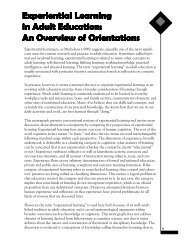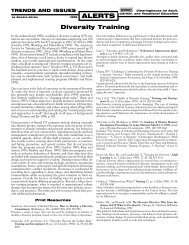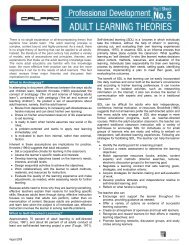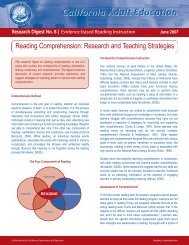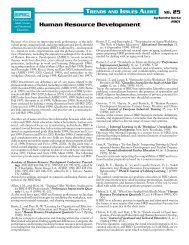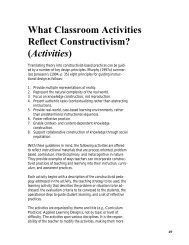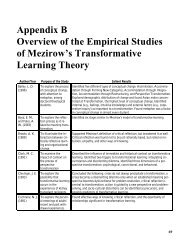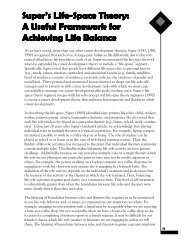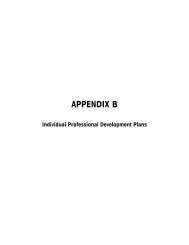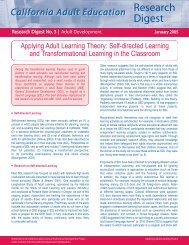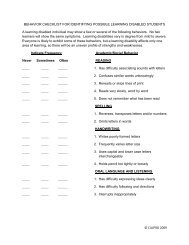Transformative Learning and the Journey of Individuation - CALPRO
Transformative Learning and the Journey of Individuation - CALPRO
Transformative Learning and the Journey of Individuation - CALPRO
Create successful ePaper yourself
Turn your PDF publications into a flip-book with our unique Google optimized e-Paper software.
Working with Images<br />
Many learning situations are capable <strong>of</strong> evoking potentially powerful<br />
emotions <strong>and</strong> images among adults. In a transformative pedagogy<br />
informed by <strong>the</strong> mytho-poetic perspective, <strong>the</strong>se emotions <strong>and</strong><br />
images are given voice, expression, <strong>and</strong> elaboration. Strategies to<br />
foster this form <strong>of</strong> learning engage <strong>the</strong> adult imaginatively with <strong>the</strong><br />
content or processes <strong>of</strong> <strong>the</strong> learning situation. Educators working<br />
from this perspective will make substantial use, regardless <strong>of</strong> <strong>the</strong><br />
subject matter, <strong>of</strong> story, myths, poetry, music, drawing, art, journaling,<br />
dance, rituals, or performance. Such approaches allow learners to<br />
become aware <strong>of</strong> <strong>and</strong> give voice to <strong>the</strong> images <strong>and</strong> unconscious dynamics<br />
that may be animating <strong>the</strong>ir psychic lives within <strong>the</strong> context<br />
<strong>of</strong> <strong>the</strong> subject matter <strong>and</strong> <strong>the</strong> learning process.<br />
These unconscious aspects <strong>of</strong> psyches are almost continuously seeking<br />
expression within our lives, <strong>of</strong>ten in unconscious <strong>and</strong> disruptive<br />
ways. The intent here is to deepen a sense <strong>of</strong> wholeness by, paradoxically,<br />
differentiating, naming, <strong>and</strong> elaborating all <strong>the</strong> different<br />
selves that make up who we are as persons. Engaging in dialog with<br />
<strong>the</strong>se structures is a way <strong>of</strong> consciously participating in <strong>the</strong> process<br />
<strong>of</strong> individuation <strong>and</strong> integrating <strong>the</strong>m more fully within our conscious<br />
lives. Research <strong>and</strong> <strong>the</strong>ory in depth psychology provides us<br />
with some ideas about how to work with <strong>the</strong> images that might arise<br />
within educational contexts (Sells 2000; Ulanov 1999). This process,<br />
referred to as <strong>the</strong> “imaginal method,” reflects a general collection<br />
<strong>of</strong> strategies useful in fostering learners’ insight into those aspects<br />
<strong>of</strong> <strong>the</strong>mselves <strong>and</strong> <strong>the</strong>ir worlds that remain hidden from<br />
conscious awareness, yet serve to influence <strong>and</strong> shape <strong>the</strong>ir sense <strong>of</strong><br />
self, interpretations <strong>of</strong> <strong>the</strong>ir external world, <strong>and</strong> <strong>the</strong>ir day-to-day<br />
actions. The specific steps <strong>of</strong> this process vary but generally involve<br />
(1) describing <strong>the</strong> image as clearly as we can; (2) associating <strong>the</strong> image<br />
with o<strong>the</strong>r aspects <strong>of</strong> our lives; (3) amplifying <strong>the</strong> image through<br />
use <strong>of</strong> stories, poetry, fairy tales, or myths that present us with similar<br />
images; <strong>and</strong> (4) animating <strong>the</strong> image by allowing it to talk or<br />
interact fur<strong>the</strong>r with us through additional fantasy, or imaging work.<br />
These processes may be used with writing, drawing, dialogue, story<br />
telling, performance, dance, or o<strong>the</strong>r methods described earlier. In<br />
addition, learners <strong>and</strong> educators may decide to use all or only some<br />
<strong>of</strong> <strong>the</strong>se steps, depending on <strong>the</strong> particular images presented <strong>and</strong><br />
<strong>the</strong> directions for work <strong>the</strong>y suggest.<br />
Conclusion<br />
From <strong>the</strong> perspective discussed here, we are all influenced <strong>and</strong> shaped<br />
by <strong>the</strong> forces <strong>of</strong> individuation going on unconsciously within our<br />
lives. Whe<strong>the</strong>r or not we are aware <strong>of</strong> <strong>the</strong>m, <strong>the</strong>se forces propel us<br />
along a journey <strong>and</strong> certain courses <strong>of</strong> action. <strong>Transformative</strong> learning<br />
refers to processes through which we consciously participate in<br />
this journey <strong>of</strong> individuation. Through imaginative engagement with<br />
<strong>the</strong> images <strong>and</strong> symbols that characterize this journey, we can come<br />
to a deeper underst<strong>and</strong>ing <strong>of</strong> ourselves <strong>and</strong> our relationship with<br />
<strong>the</strong> world around us. Often through such learning, much to our<br />
surprise, we find that <strong>the</strong> direction <strong>and</strong> nature <strong>of</strong> this deeper journey<br />
do not always reflect <strong>the</strong> choices <strong>and</strong> judgments <strong>of</strong> our egodominated<br />
consciousness. This lack <strong>of</strong> parallel between our inner,<br />
unconscious life <strong>and</strong> ego-consciousness is <strong>of</strong>ten reflected in feelings<br />
<strong>of</strong> “swimming upstream” or “rowing against <strong>the</strong> current.” When we<br />
consciously engage <strong>the</strong> poetic messages <strong>the</strong> unconscious <strong>of</strong>fers to<br />
us, we begin to experience an alignment <strong>of</strong> our outer lives with <strong>the</strong><br />
movement <strong>of</strong> individuation.<br />
We have much to learn about how <strong>the</strong>se processes manifest <strong>the</strong>mselves<br />
within adult learning. The work <strong>of</strong> Boyd <strong>and</strong> his colleagues<br />
represents only a very modest beginning. Much <strong>of</strong> what is published<br />
thus far related to this view <strong>of</strong> transformative learning represents<br />
<strong>the</strong>oretical work, grounded in <strong>the</strong> research <strong>of</strong> depth psychology.<br />
Research approaches in education, even into transformative learning,<br />
are largely dominated by rational, logical, ego-based conceptions<br />
<strong>of</strong> knowing. To begin to “see” <strong>the</strong> mytho-poetic manifestations<br />
<strong>of</strong> transformative learning within adult learning, we need to<br />
be willing to entertain learning <strong>and</strong> knowing as imaginative processes.<br />
Although <strong>the</strong> <strong>the</strong>oretical <strong>and</strong> methodological challenges are<br />
large, Boyd’s pioneering efforts in this area point to <strong>the</strong> possibilities<br />
<strong>and</strong> rewards <strong>of</strong> such an effort. In characterizing <strong>the</strong> powerful role <strong>of</strong><br />
<strong>the</strong> imagination in our lives, Hollis (2000) quotes Novalis, a Romantic<br />
German poet <strong>and</strong> <strong>the</strong>orist: “Poetry heals <strong>the</strong> wounds reason<br />
creates” (p. 35). Boyd’s view <strong>of</strong> transformative learning invites us to<br />
embrace a more mytho-poetic underst<strong>and</strong>ing <strong>of</strong> education, to deepen<br />
our sense <strong>of</strong> its emotional <strong>and</strong> spiritual depth.<br />
References<br />
Boyd, R. D. “Facilitating Personal Transformations in Small Groups: Part<br />
I.” Small Group Behavior 20, no. 4 (1989): 459-474.<br />
Boyd, R. D., ed. Personal Transformations in Small Groups: A Jungian<br />
Perspective. London: Routledge, 1991.<br />
Boyd, R.D., <strong>and</strong> Myers, J. G. “<strong>Transformative</strong> Education.” International<br />
Journal <strong>of</strong> Lifelong Education 7, no. 4 (1988): 261-284.<br />
Clark, M.C., <strong>and</strong> Dirkx, J. M. “Moving Beyond a Unitary Self: A Reflective<br />
Dialogue.” In H<strong>and</strong>book <strong>of</strong> Adult <strong>and</strong> Continuing Education, new<br />
ed., edited by A. L. Wilson <strong>and</strong> E. R. Hayes. San Francisco: Jossey-Bass,<br />
2000.<br />
Cranton, P. Underst<strong>and</strong>ing <strong>and</strong> Promoting <strong>Transformative</strong> <strong>Learning</strong>. San<br />
Francisco: Jossey-Bass, 1994.<br />
Dirkx, J. M. “Nurturing Soul in Adult <strong>Learning</strong>.” In New Directions for<br />
Adult <strong>and</strong> Continuing Education, no. 74, edited by P. Cranton, pp. 79-<br />
88. San Francisco: Jossey-Bass, 1997.<br />
Dirkx, J M. “Knowing <strong>the</strong> Self Through Fantasy: Toward a Mytho-poetic<br />
View <strong>of</strong> <strong>Transformative</strong> <strong>Learning</strong>.” In Proceedings <strong>of</strong> <strong>the</strong> 39th Annual<br />
Adult Education Research Conference, comp. by J. C. Kimmel, pp. 137-<br />
142. San Antonio, TX: University <strong>of</strong> Incarnate Word <strong>and</strong> Texas A&M<br />
University, 1998. (ED 426 247)<br />
Dirkx, J. M. “After <strong>the</strong> Burning Bush: <strong>Transformative</strong> <strong>Learning</strong> as Imaginative<br />
Engagement with Everyday Experience.” In Proceedings <strong>of</strong> <strong>the</strong><br />
Third International <strong>Transformative</strong> <strong>Learning</strong> Conference, Columbia<br />
University, New York, October 26-28, 2000.<br />
Dirkx, J. M., <strong>and</strong> Deems, T. A. “Towards an Ecology <strong>of</strong> Soul in Work:<br />
Implications for HRD.” In Academy <strong>of</strong> Human Resource Development<br />
1996 Conference Proceedings, edited by E. F. Holton, III. Austin, TX:<br />
Academy <strong>of</strong> Human Resource Development, 1996. (ED 403 461)<br />
Hollis, J. The Archetypal Imagination. College Station: Texas A&M University<br />
Press, 2000.<br />
Jacoby, M. <strong>Individuation</strong> <strong>and</strong> Narcissism: The Psychology <strong>of</strong> <strong>the</strong> Self in<br />
Jung <strong>and</strong> Kohut. London: Routledge, 1990.<br />
Kritskaya, O. V., <strong>and</strong> Dirkx, J. M. “Mediating Meaning-making: The Process<br />
<strong>of</strong> Symbolic Action in <strong>Transformative</strong> <strong>Learning</strong>.” In Proceedings <strong>of</strong><br />
<strong>the</strong> 41st Annual Adult Education Research Conference, edited by T. J.<br />
Sork, V. Chapman, <strong>and</strong> R. St. Clair, pp. 216-220. Vancouver: University<br />
<strong>of</strong> British Columbia, 2000.<br />
Merriam, S. B., <strong>and</strong> Caffarella, R. S. <strong>Learning</strong> in Adulthood: A Comprehensive<br />
Guide. 2d ed. San Francisco: Jossey-Bass, 1999.<br />
Mezirow, J. <strong>Transformative</strong> Dimensions <strong>of</strong> Adult <strong>Learning</strong>. San Francisco:<br />
Jossey-Bass, 1991.<br />
Moore, T. Care <strong>of</strong> <strong>the</strong> Soul: A Guide for Cultivating Depth <strong>and</strong> Sacredness<br />
in Everyday Life. New York: HarperCollins, 1992.<br />
Nelson, A. “Imaging <strong>and</strong> Critical Reflection in Autobiography.” In Proceedings<br />
<strong>of</strong> <strong>the</strong> 38th Annual Adult Education Research Conference,<br />
edited by R. E. Nolan <strong>and</strong> H. Chelesvig. Stillwater: Oklahoma State<br />
University, 1997. (ED 409 460)<br />
Scott, S. M. “The Grieving Soul in <strong>the</strong> Transformation Process.” In New<br />
Directions for Adult <strong>and</strong> Continuing Education, no. 74, edited by P.<br />
Cranton, pp. 31-50. San Francisco: Jossey-Bass, 1997.<br />
Sells, B, ed. Working with Images: The Theoretical Base <strong>of</strong> Archetypal<br />
Psychology. Woodstock, CT: Spring Publications, 2000.<br />
Ulanov, A. B. Religion <strong>and</strong> <strong>the</strong> Spiritual in Carl Jung. New York: Paulist<br />
Press, 1999.<br />
This project has been funded at least in part with Federal funds from <strong>the</strong> U.S. Department<br />
<strong>of</strong> Education under Contract No. ED-99-CO-0013. The content <strong>of</strong> this<br />
publication does not necessarily reflect <strong>the</strong> views or policies <strong>of</strong> <strong>the</strong> U.S. Department<br />
<strong>of</strong> Education nor does mention <strong>of</strong> trade names, commercial products, or organizations<br />
imply endorsement by <strong>the</strong> U.S. Government. Digests may be freely reproduced<br />
<strong>and</strong> are available at ericacve.org/fulltext.asp.



